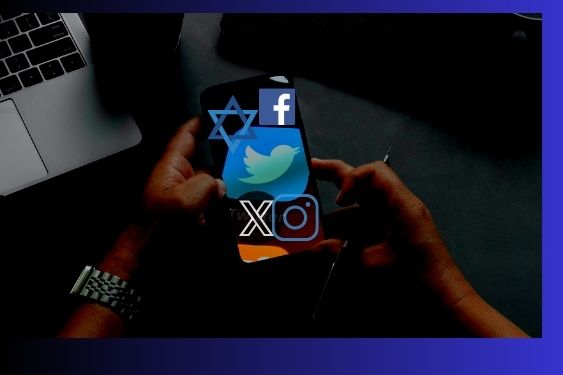
Two Jews, Three Opinions in the Age of Online Rage
Two Jews, three opinions: it’s one of those stereotype-meets-truths attached to Judaism, a tradition, as we so often hear, that holds back-and-forth discourse as paramount. The Torah begins with two different versions of the creation story, and of course the Talmud is rife with Rabbinical discussion, debate, and even disagreement.
In short, Jews are a people famous for intelligent debate. Why, then, are we so eager to tear each other apart when it comes to the war in Gaza and all issues related to Israel in particular?
Hamas’ violent attacks against Israeli Jews on October 7th was a terrible yet, paradoxically, unifying event. It seemed to me, at least, that in the immediate aftermath of the massacres there was a brief moment where Jews (and even a few non-Jewish allies) were held together by our shock, anger, and grief; where we felt like one global community connected by trauma, yes, but also so much more.
It didn’t take long, though, for that moment to pass, as anti-Jewish hatred, ever simmering just under the surface of daily life, rose its ugly head in violent, scary ways before most Jews even had time to process the October 7th attacks, putting an already on-edge community on the defensive. At the very same time, the Netanyahu administration ramped up military operations, and criticism of the mass civilian casualties and humanitarian disaster in Gaza grew, too. Something troubling began to happen within Jewish spaces. Suddenly broad terms like “ceasefire” and “Zionism” became the kind of fury-inducing sparks that ignited polarizing reactions and even cruelty.
This divide is especially stark in online Jewish spaces that, before the Hamas attack and ensuing war, felt like the last safe spaces on the internet. Facebook groups, Jewish-interest social media accounts, and even Jewish sub-Reddits were digital forums where Jews from across the globe could come together for virtual community. Since the war began, though, these spaces have changed. Especially troubling to me is how common it’s become for Jews to weaponize the term “self-hating Jew” or even “not a real Jew” to attack other Jews whose opinions on the conflict do not directly align with their own. In an online comment that has stuck with me, for instance, one Jewish keyboard warrior told another Jew that a Jew “would literally have to hate themselves” to question Israel’s political and military leadership. Others attack fellow Jews as “antisemitic” or “Nazi sympathizers,” in addition to the ubiquitous “self-hating,” or suggest that other Jews are not “really” Jewish or not Jewish “enough”—as if there were a single dogma to which one must pledge allegiance in order to be an official member of the tribe.
No Jew has the supreme authority to proclaim another Jew’s relative Jewishness, yet this name-calling has become worryingly common. To be sure, the comments section is not necessarily a space where nuanced debate is easily facilitated. But the quickness to demean other Jews in this way is bullying and it brings up fundamental questions about our identity. Are Jews people who think the same way, believe the same things, or have the same moral code? Or are we as diverse–even ethically and morally–as everyone else. And what has happened to two Jews, three opinions? The culture of debate?
My point here is not to change anyone’s political stance, but to urge Jews to approach fellow Jews with empathy and a willingness to listen – instead of jumping directly to hateful insults – when it comes to matters both big and small. Jews are not a homogenous group, but, in fact, are a highly diverse bunch whose members represent all walks of life and have unique experiences that provide us with different perspectives.
The Mishnah, in fact, encourages Jews to approach disagreements as Machloket l’shem Shamayim, which translates to something like “argument for the sake of Heaven”: disagreeing with someone out a place of mutual respect – without hubris – where each can agree that the betterment of humanity is the ultimate goal. Rabbis Hillel and Shammai are often looked at as the ultimate example of Rabbinic Machloket l’shem Shamayim: two sages who often disagreed but treated the other’s perspectives with dignity and respect.
Jewish people will, and should be talking about what is happening in Israel, Gaza, and now, unfortunately, the larger Middle East, but maybe we can strive to do so in a way that is heavenly: l’shem Shamayim. After all, even when lives are on the line, our online arguments are just that.
What if we start here? Safety and peace for our fellow Jews and for Palestinians, both there and everywhere, is a good and nearly universal desire. Our differences, our vast differences, amount to how to best achieve that (and at what cost). Denying someone’s Jewishness defies the spirit of Machloket l’shem Shamayim and threatens our communities from the inside. Attacking each other with broad strokes leaves no room for real discussion and certainly no room for growth, progress, or peace.
Historically, Jews have dealt with so much violence, discrimination, and hate enacted by outside forces: we cannot afford to inflict pain against each other. And perhaps–that’s why we inflict pain against each other?
But at the very least, no Jew gets to define another person’s Jewishness, especially not in the semi-anonymity of the internet. As Michael Chabon astutely observes, “the history of Israel, like the history of the Jewish people and of the human race, has been from the beginning a record of glory and fiasco, triumph and error, greatness and meanness, charity and crime.” That is, Jews are not – and never have been – a monolith. Rather, we are a diverse group that contains both the best and worst of humanity because we are humans–not more and not less.



